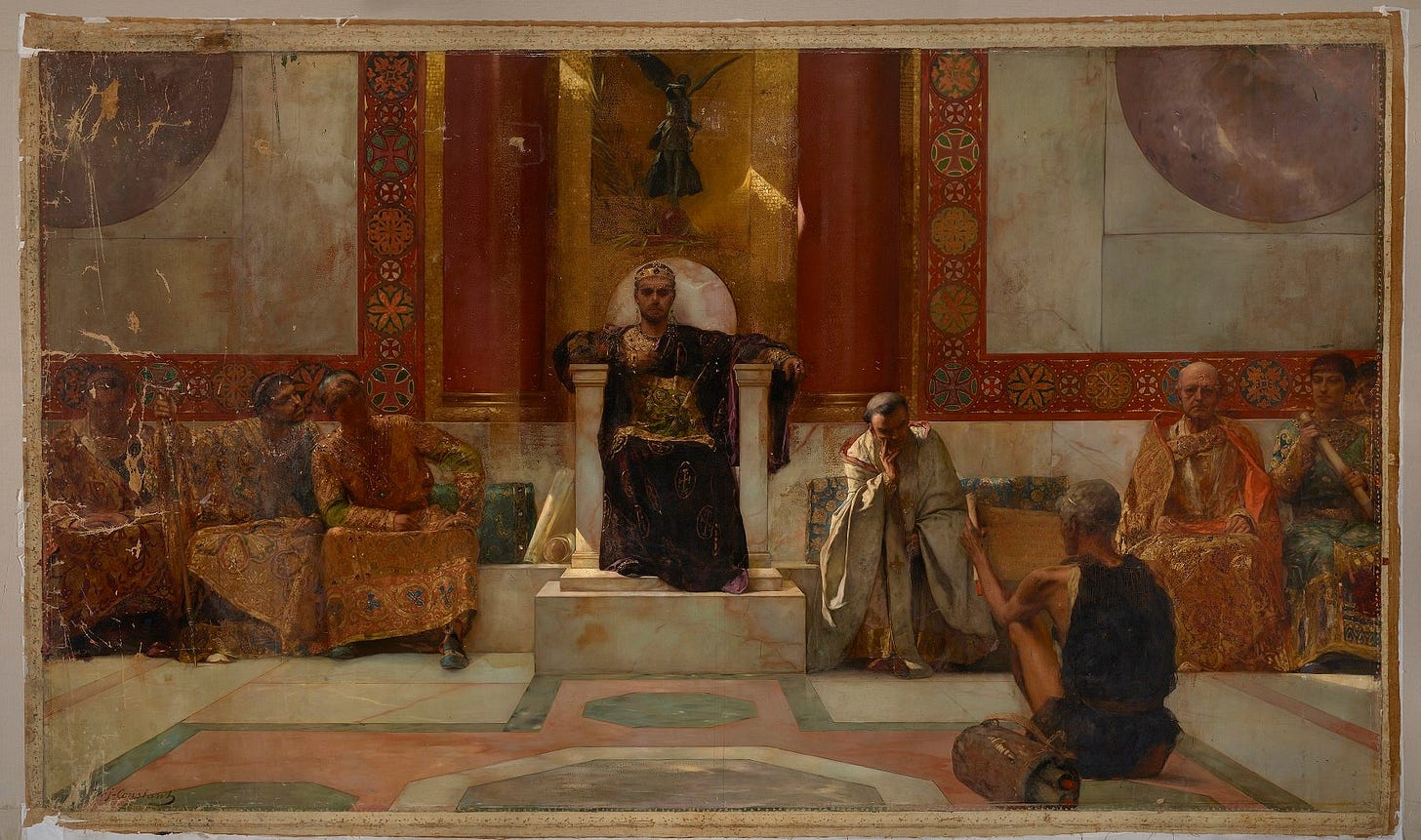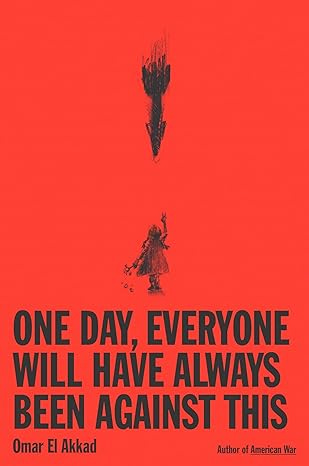Sunday, June 15 - Lex Maligna, Lego Inferna
The defenders of civilization gather to impose control, but the Slave rises—silencing them, laying waste to Latin law and Greek thought in a single blow, to raise the poor from desolation.
In Dark Sayings, I explain how Emperor Justinian stands as a striking example of imperial harlotry. Like all rulers, he filtered Scripture through his own agenda—much like what we see in 2025, with elites twisting the biblical text to justify the very actions it condemns. Today’s world leaders are effectively reenacting the sins of the Bible’s villains.
If it weren’t a tragedy, it would be a comedy. I’d sit with Jonah beneath the vine—bag of popcorn in hand.
What came of Justinian copying the sins condemned in Scripture?
A massive stone temple—still longed for today. This longing betrays a rejection of the preaching of the story of the Gerasene demoniac, where God himself, through his anointed Slave, rejects Roman law and silences the Greek intellectual tradition.
In defiance of this witness, Justinian—praised even now—translated Roman law into Greek, a move that flatly contradicts the biblical text.
O foolish Galatians. You asked for a king, and you got one.
Justinian’s reign was marked by a bloody attempt to resurrect Rome’s former glory: the North African campaign against the Vandals, the prolonged and ruinous Gothic Wars in Italy, and a brief incursion into southern Spain. These campaigns were catastrophically expensive, devastating to local populations, and—like all imperial games—ended in failure. Far worse was the Justinianic Plague, a lethal epidemic that ravaged both the population and the economy.
Together, these calamities fractured the region’s future. Though the Western Roman Empire had already collapsed in the 5th century, Justinian’s ambitions destabilized its successors and hindered the organic development of local societies.
Things might have turned out differently. We might have avoided the first Dark Age—or at least the first one we know of—had Justinian not tried to impose a new civilization atop the ruins of the old.
Dear friends:
There is no God but One.
He is the Heavenly Shepherd.
He claims no embassy, joins no assembly, and takes no seat at your councils.
He casts no vote, answers to no electorate, and has no constituents.
He occupies no office, nor does he dwell in any capital.
He is beholden to nothing and answers to no one.
His throne is in the heavens, far beyond your reach, where maps are not drawn.
Be afraid oh nations.
Tremble with fear, oh bordermongers, for he is not mocked—
Not by you, nor your puny gods, nor your counterfeit leaders.
I place all my hope in his Slave who trusted in his command to subdue the Latin-lex and silence the Greco-lego at the Decapolis in Luke.
Everything I do, I do for this Slave’s Rebellion.
This week, I discuss Luke 8:30.
This episode is dedicated to my cousin, Isabella Yacoub, in celebration of her graduation, in honor of her dad.

Show Notes
ἐρημόω (erēmoō) / ח־ר־ב (ḥet–resh–bet) / خ–ر–ب (khāʾ–rāʾ–bāʾ)
To dry up, to be desolate, or to be destroyed. To be devastated, often referring to lands, cities, or nations. Greek examples in the LXX include: ξηραίνω (xērainō - to dry up), ἐρημόω (erēmoō - to make desolate), ἀφανίζω (aphanizō - to destroy).
In Hebrew חָרַב and Arabic خَرِبَ both describe the undoing of cities, structures, or human systems—especially in the wake of divine judgment.
In both the Bible and the Qur’an, ruin is not random—it is the consequence of injustice, arrogance, or rejection of divine instruction.
Isaiah 51:10 – “Was it not you who dried up (הַמַּחֲרֶבֶת [ha-maḥărébet]) the sea…”
Surah Al-Hashr 59:2 - “They destroy (يُخْرِبُونَ [yukh’ribūna]) their houses with their own hands…” يُخْرِبُونَ (yukh’ribūna) comes from خَرَّبَ (khar·ra·ba) — they lay waste / destroy, describing the self-inflicted ruin of the Banu Nadir tribe, continuing on the itinerary of civilizational ruin brought on by pride and resistance to God’s covenant.
The function ח-ר-ב (ḥ-r-b) appears in Scripture to prescribe the destruction of cities and the downfall of kings—figures aligned with human systems of law and control. This same root functions in the name Mount Horeb, the site where divine law is given. It also functions as “sword,” an agent of God’s judgment. In Exodus 32:27, Moses commands the Levites at Horeb to take up their swords ח-ר-ב (ḥ-r-b) and execute judgment within the camp after the sin of the golden calf, connecting the themes of lawgiving and purifying violence. ח-ר-ב (ḥ-r-b) highlights the biblical tension between the collapse of human law and the assertion of divine will through biblical instruction and judgment.
In the Septuagint, ἐρημόω (erēmoō) corresponds lexically to ח-ר-ב (ḥ-r-b) in the following passages: Judges 16:24; 2 Kings 19:17; Job 14:11; Isaiah 34:10; Isaiah 37:18, 25; Isaiah 44:27; Isaiah 49:17; Isaiah 51:10; Isaiah 60:12; Jeremiah 28:36; Jeremiah 33:9; Ezekiel 26:2, 19; Ezekiel 29:12; Ezekiel 30:7; Amos 7:9.
Λεγιών (legiṓn)
(For a detailed discussion, please see Blaise Webster’s article, The Crux of Paul and John’s Gospel.)
From the Latin legio, meaning legion, a Roman military unit (~6,000 soldiers), itself from the Indo-European root legō.
From Latin legō, we also get Lex—law (that which is gathered or set in order)
Lex, derived from legō, becomes a symbol of civilizational control—a codified system that enforces order, often violently.
Roman Legions (from the same root) are the custodians of lex, instruments of imperial coercion and domination.
Lex and legion are bound together both linguistically and ideologically—law enforced by gathered violence.
In Greek, λόγος (logos) stems from λέγω and is associated in Hellenistic philosophy with reason, logic, and natural law. The Pauline School’s co-opting of this term is an attack on Hellenism.
For Paul, λόγος is not Greek reason, but shorthand for “the word of the cross” (ὁ λόγος τοῦ σταυροῦ)—foolishness to the world and power to those being saved, who trust in God’s victory (1 Corinthians 1:18); Knowing that his work will find its own completion in the Day of the Lord. (Philippians 1:6)
Unlike the constructive Greek logos, which seeks order and coherence, the Pauline logos is destructive—an insurgent word embedded within Greco-Roman structures, intended to bring about their co-termination in the execution of Jesus, thereby dismantling the entire system.
Lex (law) and lego (rhetoric/philosophy) represent false structures of control and meaning, in opposition to the Pauline gospel.
The crucified Christ is the one who destroys both lex and lego, exposing their powerlessness and raising the poor in their place.
Iron Sharpens Iron
Fr. Aaron Warwick
Fr. Aaron and Jason Ewertt host Teach Me Thy Statutes on the Ephesus School Network.
Fr. Fred Shaheen
Fr. Fred hosts A Light to the Nations on the Ephesus School Network.'
The lexicology of fei 非
Shepherd’s note: Matthew’s lexicological analysis of 非 (fēi) is a meditation on God’s opposition to human limitation. Tracing fēi from its classical role as “to oppose” or “to negate” to its modern usage as a ubiquitous intensifier, he uncovers a conceptual thread linking Chinese and biblical thought: the wisdom of resistance. In the Book of Rites, propriety is transgressed when reciprocity breaks down, just as in Numbers 30:5, a father’s opposition nullifies a vow, revealing restraint as a sacred force. Through texts like Isaiah 55:8–9—“my thoughts are not your thoughts… my ways higher than your ways”—Matthew shows that fēi conveys more than negation; it names the irreducible distance between God and man. Whether in the moral logic of the Odes or the prophetic declarations of Scripture, the message resounds: what defines the holy is not similarity to humanity, but its radical non-likeness—its 非.
דברה (w/ excursus on the Oracula Sybillina)
Shepherd’s Note: Blaise traces the thread of the root ד-ב-ר (d-b-r) across biblical Hebrew, Qur’anic Arabic, and Hellenistic literature, revealing its thematic role in divine instruction and pastoral authority. From Daniel 2:30, where dibrat grounds the prophetic revelation “for the cause” of the king’s understanding, to Ecclesiastes 3:18 and 7:14, where dibrat underscores both human frailty and divine providence, he highlights how this root encodes movement, cause, and command. He links this to the Arabic تَدَبَّرَ (tadabbara) in Qur’an 4:82, where followers are urged to “reflect upon” the revelation, and to دَابِر (dābir) in Qur’an 6:45, denoting the complete destruction of evildoers. Through the figure of Deborah—judge, prophetess, and poet—who sits not in a temple but beneath a palm tree dispensing divine counsel, he reframes her as a Hebrew sibyl, distinct from her Hellenistic counterparts by virtue of her freely given wisdom rooted in God’s cause, not human payment. In doing so, he connects her poetic exhortation in Judges 5:12—“Awake, Deborah, speak a song!”—to a broader literary tradition of apocalyptic resistance, echoing Persian sibylline anti-Hellenism and the prophetic stance of a Torah that walks barefoot through the wilderness.
“Now, for a new generation, the same moment arrives. To watch the leader of the most powerful nation on earth endorse and finance a genocide prompts not a passing kind of disgust or anger, but a severance. The empire may claim fear of violence because the fear of violence justifies any measure of violence in return, but this severance is of another kind: a walking away, a noninvolvement with the machinery that would produce, or allow to produce, such horror. What has happened, for all the future bloodshed it will prompt, will be remembered as the moment millions of people looked at the West, the rules-based order, the shell of modern liberalism and the capitalistic thing it serves, and said: I want nothing to do with this.
Here, then, is an account of an ending.”
Omar El Akkad, “One Day, Everyone Will Have Always Been Against This”







